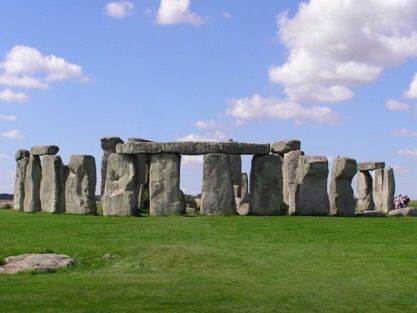Kelly 自言自语: 我在读这篇文中时,我去Youtube找了相关的巨石阵的视频来看,对它有了更全面的了解。https://youtu.be/rmZLapFjdr8
其实学习英语也好,做学问也好,最重要的是全面了解,融会贯通。
The History of Stonehenge
Deep in the heart of England, by the side of a road, stands a massive stone monument that has mystified visitors for millennia.
It is called Stonehenge, and it is an ancient stone circle, older than the pyramids of Giza.
What little is known about its history has been pieced together by archaeologists, because it is so old that there is no written record of its construction, or of its original purpose.
Stonehenge is probably between 4,000 and 5,000 years old, and its construction was spread across hundreds or even thousands of years.
It was used, among other things, as a place of burial.
Some think it may also have been used as a calendar, or as a place to study the movements of the stars and worship the Sun and Moon.
Although we may never know exactly why Stonehenge was built, most believe it was used for religious ceremonies.
The earliest versions of Stonehenge were made of earthworks and ditches dug with tools made of antlers.
This was eventually replaced by some kind of wooden structure, which was replaced in turn by circles of massive standing stones.
The stones at Stonehenge were brought there over a period of several hundred years.
The largest stones, called sarsens, measure up to 30 feet or 9 meters tall and weigh an average of 25 tons.
These stones were probably transported 20 miles or 32 kilometers to Stonehenge.
Some of the smaller stones, called bluestones, are believed to have been brought from Wales, more than 140 miles or 225 kilometers away.
Although they are smaller than the massive sarsens, the bluestones still weigh an average of 4 tons each, and archaeologists are baffled as to how they were transported so far without modern technology-or even the wheel!
Some people think the stones were rolled on tree trunks, or dragged in huge baskets pulled by oxen.
Others believe they were moved by boat, with the help of the nearby river Avon.
However the stones were moved, they were placed with incredible precision.
Certain stones in the ancient circle line up with the midsummer sunrise and the winter solstice sunset, marking the longest and shortest days of the year.
Today Stonehenge is a carefully protected World Heritage Site visited by about a million people each year,
and many people still visit Stonehenge at midsummer and midwinter to view the ancient phenomena that marks the rising and the setting of the sun, and wonder at the mysteries Stonehenge still hides.
在英格兰的中心地带,在大路一侧,矗立着一座令数千年以来的游客们困惑不解的巨大的石头纪念碑。
它叫做巨石阵,它是一个古老的石圈,比吉萨金字塔还要古老。
我们仅知的关于它的一些历史被考古学家们拼凑了起来,因为它太古老了,没有建造它的书面档案,也没有其建造的原始目的。
巨石阵大概有4000到5000年之间那么古老了,而它的建造已经延续到数百甚至数千年了。
它现在被用作一个墓地。
有些人认为它可能也被用作过日历,或者是一个研究恒星运动和崇拜日月的地方。
尽管我们可能永远不知道为什么建造了巨石阵,但大多数人相信它是被用作了宗教仪式。
最早的巨石阵是使用鹿角做成的工具由土木工事和沟渠。
它最终被某种木质结构所取代,这些结构被巨大的站立的石块所取代。巨石阵的石头在数百年内被带到那里。
最大的石头被称为砂岩漂砾,高达30英尺,也就是9米高,平均重达25吨。
这些石头可能被运送到20英里或32公里的巨石阵。一些小石头被称为青石,据信是从威尔士带来的,距离140多英里或225公里以外。
虽然它们的体重比大规模的大大小小,但是它们的平均重量为每人4吨,考古学家对他们如何在不使用现代科技甚至轮子的情况下运送这么远的距离而感到困惑。
有些人认为石头是在树干上滚动运送,或者是被牛拉的巨大篮子。
其他人则相信他们是被船上的人搬走的,在埃文河的帮助下。
不管怎样,石头被移动了,它们被放置得非常精确。古代圆圈中的某些石头与仲夏日出的日出和冬至的日落有关标记年度最长、最短的一天。
今天,巨石阵是一个每年被数百万人小心保护的世界文物遗产。许多人仍然在仲夏时期到访巨石阵,以观察这些古老的现象标志着太阳的上升和环境的形成,思忖神巨石阵仍然隐藏着的秘密。
stonehenge巨石阵
massive大规模的,大量的
millennium,milennia一千年
pyramid金字塔
worship崇拜,爱戴
ditch沟,渠
solstice至点
mystified使困惑
baffleg阻碍的,困扰的
antler鹿角
sarsen砂岩漂砾
earthwork土木工事
calendar日历,历法,时间表
